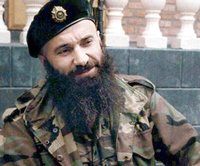 Another mysterious death of a critical journalist mars Russian media, Kommersant reports. Ivan Safronov, aged 51, was found dead at the entry of his Moscow apartment building on Friday afternoon. Authorities label the death a suicide in lack of other viable explanations. Still, the tragedy remains an enigma to friends, colleagues and family, as Safronov had no obvious reason for committing suicide. This raises questions about foul play.
Another mysterious death of a critical journalist mars Russian media, Kommersant reports. Ivan Safronov, aged 51, was found dead at the entry of his Moscow apartment building on Friday afternoon. Authorities label the death a suicide in lack of other viable explanations. Still, the tragedy remains an enigma to friends, colleagues and family, as Safronov had no obvious reason for committing suicide. This raises questions about foul play. Ivan Safronov was a relatively well-known security and military reporter for the Russian newspaper Kommersant. As a retired colonel, he had unique insight into the workings of the Russian security community. Safronov was also known as an outspoken critic to influential groups among the so called siloviki. His openness sparked irritation amongst high-ranking security officials, and only the other years the Federal Security Service (FSB), made allegations against him for disclosing state secrets. However, charges were dropped since Safronov had shown that his sources were openly accessible on the Internet.
Concerning the circumstances surrounding Safronov's untimely demise, they are equally simple as enigmatic. As previously stated, the journalist was found dead at the entry of his Moscow apartment building. Apparently,
 he had fallen from a staircase window on the fifth floor of the house, situated a couple of floors above his own apartment. Left behind him on the landing was a bag of oranges, which only adds to the peculiarity of the case. There were no eyewitnesses to the event, although some students heard a loud thump, as Safronov apparently hit the ground. Calling for an ambulance, the students were rejected with the words: "We can't pick up every drunkard in Moscow on a Friday night."
he had fallen from a staircase window on the fifth floor of the house, situated a couple of floors above his own apartment. Left behind him on the landing was a bag of oranges, which only adds to the peculiarity of the case. There were no eyewitnesses to the event, although some students heard a loud thump, as Safronov apparently hit the ground. Calling for an ambulance, the students were rejected with the words: "We can't pick up every drunkard in Moscow on a Friday night."Then, did anyone push Safronov out of the window? Probably not. He was quite a sturdy man, so throwing him out of a window would have taken at least a couple of people and had probably stired quite some commotion. Also, none of Safronov's neighbours heard anything, and there were no signs of struggle by the third floor window. Still, questions linger on among fellow journalists in both Russia and abroad. Hence, the propensity in the media to cite all circumstances surrounding Safronov's death.
So, should one assume that Safronov fell victim to enemies within the security establishment? As of now, there is no evidence to support this. Still, why Safronov would kill himself, as authorities assume, remains a mystery as there were no indications in this direction prior to his death. So, is the international attention to this case only an attempt to exploit the tragic death of an individual? Perhaps, and perhaps not. The reasons for Safronov's death will probably remain an enigma for posterity to solve. In the meantime, it will be recorded as the death of yet another critical Russian journalist, and thus only add to the image of how exposed the position of media is in current Russia. Let us but hope that this does not serve to obscure the human tragedy of Safronov's death.




